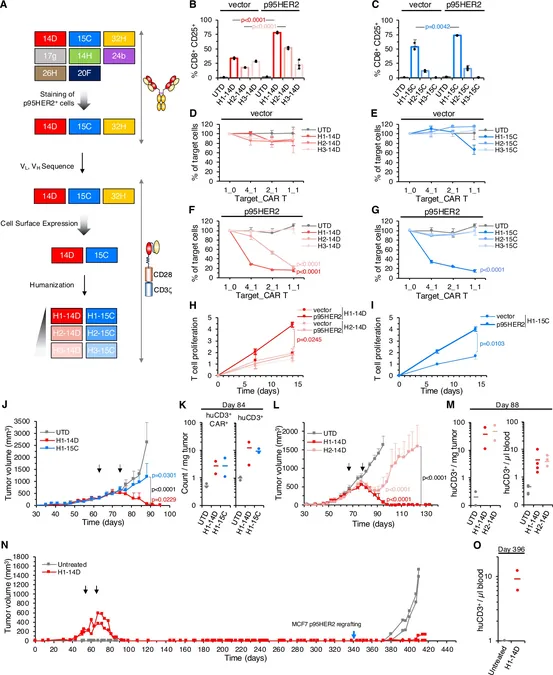
Breakthrough CAR T-Cell Therapy Shows Promise Against Aggressive HER2-Positive Tumors
2024-11-18
Author: John Tan
Introduction
In a groundbreaking study, researchers from the Vall d'Hebron Institute of Oncology (VHIO) and the Hospital del Mar Research Institute (HMRI) in Barcelona have developed a revolutionary CAR T-cell therapy that effectively targets HER2-positive tumors that express the aggressive p95HER2 protein. This novel treatment could potentially transform the landscape of cancer therapy, particularly for patients battling advanced forms of breast cancer.
The Challenge of HER2-positive Tumors
HER2-positive tumors are notorious for their aggressive nature, contributing to a dismal prognosis and a significantly lower success rate with traditional therapies. Notably, around one-third of these tumors express the p95HER2 form of the HER2 receptor, further complicating treatment outcomes.
Innovative CAR T-Cell Therapy
The newly engineered CAR T-cells developed by the research team specifically target these p95HER2-expressing cells while simultaneously activating immune cells in the tumor microenvironment, setting the stage for a more robust anti-tumor response.
Preclinical Testing Results
In preclinical testing reported in the journal *Nature Communications*, this innovative therapy demonstrated not only safety but also complete and lasting anti-tumor responses in various HER2-positive model systems. The promising results of these trials signal that a first-in-human phase 1 clinical trial is on the horizon, pending regulatory approval, to evaluate the therapy in patients with HER2-driven tumors.
Expert Insights
Dr. Joaquín Arribas, a key researcher involved in the study, highlighted the challenge of applying CAR T-cell technology to solid tumors, which has seen remarkable success in hematological cancers. 'We’re navigating uncharted territory, but our results suggest real potential for improving outcomes in a field that needs new solutions.'
Importance of Targeting the HER2 Receptor
The importance of targeting the HER2 receptor cannot be overstated. HER2 is overexpressed in about 4% of all tumors and 15% of breast cancers. Unfortunately, a significant number of patients, especially those with advanced forms of the disease, often don’t respond well to existing HER2-targeted therapies. This creates an urgent need for innovative treatments like the novel CAR T-cell therapy that specifically addresses these challenges.
Innovative Approach with Bispecific Antibodies
Under the auspices of the Fundació BBVA CAIMI Program, researchers are pushing the envelope in cancer therapy by focusing on ways to boost the immune response against HER2-driven malignancies. They have developed a second-generation CAR T-cell that leverages bispecific antibodies to enhance efficacy, thereby ensuring that T-cells not only identify but also effectively combat cancerous cells.
Sophisticated CAR-T Treatment Design
Macarena Román, the study's first author, elaborated on the sophisticated design of the CAR-T treatment, stating that it was equipped to secrete a special bispecific antibody (TECH2Me) with an affinity refined to avoid harming healthy tissues. This clever adaptation hopes to yield a safer therapy that still delivers potent remission capabilities.
Animal Model Results
Initial experiments using patient-derived xenograft models exhibited dramatic results, with tumors substantially shrinking or disappearing entirely, allowing the treated mice to thrive without any noticeable decline in their quality of life. 'This offers a glimpse into the potential of what could be achieved in human trials,' Román said.
Future Clinical Trials
As their findings now pave the way to human trials, this research represents a beacon of hope for patients with HER2-positive cancers who have limited options left. The planned phase 1 trial aims to enroll fifteen individuals with advanced HER2 tumors who have exhausted standard treatment routes. If successful, this pioneering work could redefine therapy for HER2-positive cancers and indicate broader applications in the fight against solid tumors.
Monitoring Immune Activity
Moreover, as this project progresses, the team aims to implement non-invasive imaging strategies to monitor immune cell activity, providing critical data to enhance understanding and management of cancer dynamics in both researchers and clinicians.
Conclusion
Stay tuned for developments on this revolutionary cancer therapy as it approaches clinical testing next year! Will it be the game-changer we’ve been waiting for?





 Brasil (PT)
Brasil (PT)
 Canada (EN)
Canada (EN)
 Chile (ES)
Chile (ES)
 España (ES)
España (ES)
 France (FR)
France (FR)
 Hong Kong (EN)
Hong Kong (EN)
 Italia (IT)
Italia (IT)
 日本 (JA)
日本 (JA)
 Magyarország (HU)
Magyarország (HU)
 Norge (NO)
Norge (NO)
 Polska (PL)
Polska (PL)
 Schweiz (DE)
Schweiz (DE)
 Singapore (EN)
Singapore (EN)
 Sverige (SV)
Sverige (SV)
 Suomi (FI)
Suomi (FI)
 Türkiye (TR)
Türkiye (TR)